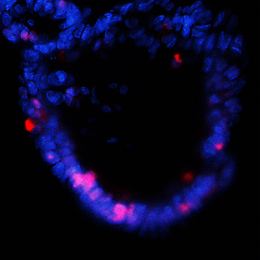Intestinal fibrosis is a frequent complication of Inflammatory Bowel Disease (IBD), which includes Crohn’s disease (CD) and ulcerative colitis (UC). The exact mechanisms leading to this fibrosis are not well understood, which complicates the development of effective treatments. This study aimed to induce and characterize inflammation-mediated fibrosis in patient-derived organoids (PDOs) from colonic biopsies of pediatric IBD patients and age-matched controls (CTRLs).
Treatment of these PDOs with TNF-α and TGF-β1 led to morphological changes and increased expression of inflammatory, mesenchymal, and fibrotic markers in both IBD and control PDOs. Transcriptomic profiling revealed that these treatments regulated genes involved in the epithelial-mesenchymal transition (EMT) and enhanced genes related to cell migration across all PDOs, regardless of disease status.
Specifically, CD-PDOs exhibited a unique response to fibrosis, characterized by the upregulation of nuclear transcription factors, distinguishing them from UC and CTRL-PDOs. This study concludes that intestinal PDOs can develop inflammation-induced fibrosis and can be a valuable model for studying fibrogenesis in IBD. Fibrotic PDOs show increased expression of EMT genes, with CD-PDOs having a distinct gene expression profile compared to UC and CTRL-PDOs.
Keywords: #organoids #inflammatory bowel disease




